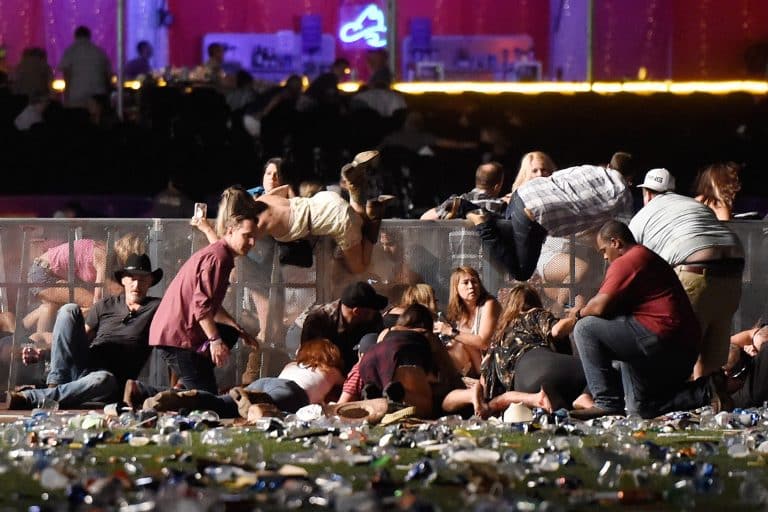
Image by David Becker/Getty Images, © All Rights Reserved.
The Mental Bargain We Make When We Use the Word “Evil”
On Monday, I woke up to my tiny daughter (my alarm clock) yelling from the other room, “Momma, it’s morning!” I heard the familiar sounds of her little sister babbling in her crib. My daily double-embodiment of innocence: new morning, new humans, always approaching a new day with a sense of wonder.
I turned over and saw a text from my husband, who is out of town: “Have you read the news?” I hadn’t. He filled me in. Exhale. F&*k.
I dragged myself to my daughters’ rooms and put on a face that, I hope, didn’t look like I had just learned that more than 50 people had been killed and hundreds more injured. I got them dressed and fed and delivered to the adults that lovingly care for them when I don’t. Then I sobbed in the car listening to an NPR host ask a national security expert if we should no longer go to music concerts.
Our president’s response to one of the deadliest mass shootings in the history of the United States of America?
“Our unity cannot be shattered by evil…”
Setting aside the assumption of unity, which is something, I have to say, I am really not feeling these days, my battered psyche has snagged on the word evil, and it won’t let go.
Is there such a thing? And if there is, what is it? Why do we want to use it so badly in moments like this? What does that desire say about us?
Evil literally means “profoundly immoral and malevolent.” In our current moment, it seems to carry a sort of metaphysical seriousness. When someone does something that we find truly inexplicable and horrible and that, importantly, we want to absolve ourselves of any responsibility for, we jump to call it evil. “Wrong-headed” is for a case where we might have been able to intercede and make a good argument for a different action. Even “mentally ill” suggests that a person is treatable, or at least that the harm his mental illness might inflict on others could have been contained. But evil — well, it’s irreconcilable with humanity and unpredictable beyond any decent reason. It’s unpreventable.
After the 2012 shooting in Aurora, Colorado, The New Yorker writer Rollo Ronig got snagged similarly by the use of the word “evil.” He writes:
“Evil is both harmful and inexplicable, but not just that; what defines an evil act is that it is permanently disorienting for all those touched by it.”
We grab for the word “evil” when we feel overwhelmed with the human capacity for death and destruction. When we feel grief that doesn’t know where to land. When we feel horrifically vulnerable. That makes sense to me. We want an act like this to be considered off the understandable spectrum of people damaging one another.
The irony is that our grab for the word “evil” seems all the more desperate when the suffering we’re witnessing is random. It is so uncomfortable to think that your brother or daughter or friend could die like those 50+ victims have — at any given moment, with no warning, while experiencing joy. It is even more uncomfortable, on some level, for us to admit that we could have prevented some of that death.
If it was evil, then it was inevitable. You cannot reasonably expect to eradicate all evil from the world. At some point, it’s going to flare up and you just have to hope that “your people” aren’t unlucky enough to be there at the movie theater or the country music concert or the elementary school. In other words, we would rather live with the belief that evil could kill us at any moment than with the belief that we could have prevented a murder (or 50) yesterday.
I don’t want to make that moral bargain in my brain anymore. I’m not going to call Stephen Paddock “evil,” and I’m not going to sit idly by when anyone else does — whether that person is my president or my neighbor. Not for his sake, but for my own. I refuse to live in a moral world of my own making where mass shootings are inevitable and don’t have anything to do with me. Instead of numbing myself with that powerful little word — “evil” — I’m going to dig into moral and strategic questions like:
Why did Paddock have 23 firearms (including an AR-15-style assault rifle) and hundreds of rounds of ammunition? Why does anyone have 23 firearms and hundreds of rounds of ammunition?
Why can’t this country agree on common sense gun legislation that would prevent the mass murder of innocent people?
What was Paddock’s mental state? Who knew about it? Why didn’t he have connections with people who were more aware of the dangers of his mental state and capable of getting him help?
Is mental illness on the rise among white men and, if so, why?
What kind of funding goes into addressing the mental health of men like Paddock?
What have I, personally, done in the wake of mass shootings in the past? How can I do something different?
It is only in asking these questions and pursuing the answers that I can look my daughters in the eyes tomorrow morning, and the next, and the next. “Evil” is a cop-out. It distances us from asking hard, important, and specific questions about how this could have been prevented and what each of us can do to save lives — actual human lives — in the future.
None of us with the power to vote, organize, and advocate is innocent in a country where this is not only possible, but frequent. Paddock intersected with our health systems, our schools, our gun policies before he put his finger on that trigger. If there is evil here, it is as subtle as you or me, anyone with a beating heart, pointing a finger at one dead man as if the moral responsibility lay only with his cold corpse.
If there is evil here, it is complacency, and it is collective.


Share your reflection